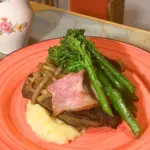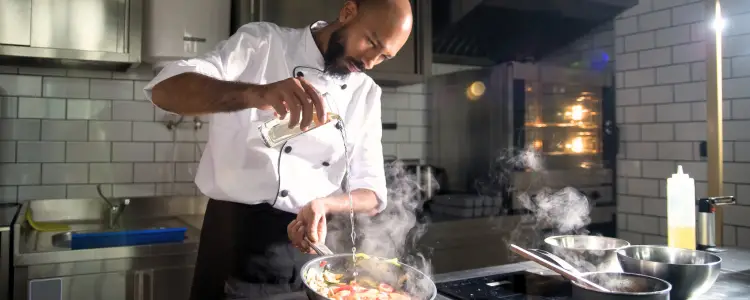In my personal experience as a head chef, It has always been my duty to make sure food sent out from the kitchen arrives at the customer’s table in perfect condition and fast. Should anything or anyone try to prevent this it is my responsibility with good reason to override the intervention irrespective of rank or authority. Any disagreements can be discussed after service but the main priority is making sure the customer is happy irrespective. The main reason is that you do not want meals being sent back, especially on a busy shift as this can seriously cause a backlog on other orders.
In a restaurant or food service setting, the head chef is typically responsible for overseeing the kitchen operations, including menu planning, food preparation, and managing kitchen staff. The head chef is generally considered to be the highest-ranking culinary position and is responsible for ensuring that the food is of high quality, the kitchen is clean and organized, and that all staff are properly trained and equipped to carry out their roles.
On the other hand, an assistant manager is responsible for managing various aspects of a business, which can include managing staff, overseeing financial operations, ensuring customer satisfaction, and supporting the overall vision of the company. In a restaurant setting, an assistant manager may work closely with the head chef to ensure that the kitchen runs smoothly, but their role is generally broader in scope than that of the head chef.
While the head chef may have more direct responsibility for the quality and consistency of the food, the assistant manager may have broader responsibilities for the overall success of the business. However, in some cases, the head chef may also hold a managerial position, in which case they would be responsible for both the culinary and business aspects of the operation.
Ultimately, the hierarchy and responsibilities of each role depend on the specific organization and industry in which they operate. In some cases, the head chef may be considered to be above the assistant manager, while in others, the two positions may be seen as more equal in status and responsibility. It’s important to consider the specific context and responsibilities of each role before making any assumptions about their relative importance or status.
Great chefs knife:

Some of my articles may contain affiliate links, which means I earn a small commission at no extra cost to you but it does help me with the running costs. As an Amazon Associate, I will earn commissions on purchases but this does not affect my reviews on products or services.
Questions and answers:
Are head chefs managers in a professional kitchen?
Yes, head chefs are generally considered to be managers in a professional kitchen. As the senior-most culinary position in the kitchen, the head chef is responsible for managing all aspects of the kitchen operation, including menu planning, food preparation, and managing kitchen staff. They are also responsible for maintaining high standards of quality, consistency, and cleanliness in the kitchen.
In addition to their culinary responsibilities, head chefs are often tasked with managing budgets, ordering supplies, and ensuring that the kitchen operates efficiently and within established guidelines. They may also be responsible for managing and training other members of the kitchen staff, including sous chefs, line cooks, and prep cooks.
While the specific duties of a head chef may vary depending on the size and type of establishment they work in, they are generally expected to have strong leadership and management skills, as well as extensive culinary knowledge and experience. They must be able to communicate effectively with their team, delegate tasks efficiently, and make quick decisions in a fast-paced and often high-pressure environment.
In addition to their management responsibilities within the kitchen, head chefs may also be involved in broader business and operational decisions for the restaurant or food service operation as a whole. They may work closely with other managers, such as the general manager or operations manager, to develop and implement strategies for the business’s success.
Overall, the role of a head chef in a professional kitchen is one of leadership, management, and culinary expertise. They are responsible for managing all aspects of the kitchen operation and ensuring that the highest standards of quality, consistency, and cleanliness are met at all times.
Why do chefs working call each other & the head chef CHEF?
In the world of professional cooking, it is customary for chefs to refer to each other as “chef.” This tradition has its roots in the French culinary tradition, where “chef” is the title given to the person in charge of the kitchen.
It is professional etiquette when working in a kitchen to call the head chef chef. In this fast and high-pressure environment, trying to remember a colleague’s name could slow down the process so much easier just to call colleagues chef. When a chef asks for something the reply is always a loud confident Yes chef, This way the head chef knows you have acknowledged him and he won’t need to ask again.
One reason why professional chefs call each other “chef” is to show respect and acknowledge the authority of the person in charge. In a professional kitchen, the head chef or executive chef is responsible for managing the kitchen staff, overseeing menu planning and food preparation, and ensuring that the kitchen operates efficiently and within established guidelines. By referring to the head chef or other senior chefs as “chef,” other kitchen staff are recognizing their authority and expertise in the culinary field.
Great T.shirt

Another reason for this tradition is to foster a sense of camaraderie and teamwork in the kitchen. Cooking in a professional kitchen can be a high-pressure and intense environment, and chefs often work long hours together in close quarters. By addressing each other as “chef,” the kitchen staff are recognizing that they are all part of the same team and are working towards a common goal.
Finally, using “chef” as a form of address in the kitchen is a way of preserving tradition and paying homage to the rich culinary history of French cuisine. French cuisine has had a significant influence on the culinary world, and many of the foundational techniques and terms used in modern cooking have their roots in French culinary tradition.
In summary, the tradition of professional chefs calling each other “chef” is a way to show respect, foster teamwork, and pay homage to the rich culinary history of French cuisine. It is an important part of the culture of professional kitchens and a sign of the professionalism and expertise of those working in the culinary field.
Why are head chefs always so angry during food service?
It is a common perception that head chefs in professional kitchens are often angry during food service. While this is not always the case, there are several reasons why a head chef may appear angry or frustrated during this time.
Firstly, food service is a high-pressure and fast-paced environment. The kitchen staff are under intense pressure to prepare and deliver food quickly and efficiently, while also maintaining the high standards of quality and presentation that are expected in a professional kitchen. This can be stressful and challenging for even the most experienced chefs, and it is not uncommon for tensions to run high during this time.
Secondly, the head chef is ultimately responsible for the success or failure of the kitchen operation during food service. They must oversee all aspects of food preparation and service, manage the kitchen staff, and make quick decisions to ensure that everything runs smoothly. This can be a daunting task, and the stress of this responsibility can sometimes manifest as anger or frustration.
Additionally, the kitchen environment can be chaotic and unpredictable during food service. Orders may come in at a rapid pace, and unexpected problems can arise, such as equipment failure or ingredient shortages. In order to keep everything on track and ensure that the food is delivered on time and to the expected standard, the head chef may need to be assertive and direct in their communication with the kitchen staff.
Finally, it is worth noting that the perception of anger or frustration among head chefs during food service may also be influenced by cultural factors. In some culinary traditions, such as French cuisine, a certain level of intensity and passion is seen as essential to achieving culinary excellence. While this can be a positive attribute in the kitchen, it can also contribute to a perception that head chefs are always angry or confrontational during food service.
In summary, the high-pressure and fast-paced nature of food service, the responsibility of managing the kitchen staff and ensuring that the food meets the expected standard, and cultural factors can all contribute to the perception that head chefs are often angry during this time. While this is not always the case, it is important for kitchen staff to be prepared for the fast-paced and often intense environment of professional kitchens.
Related posts:
- Female Chefs Reveal Why They Wear Menstrual Pants on the Job

- How to Start a Freelance Chef Career in Catering & Hotels

- Lambs Liver and bacon recipe fried Onions Gravy & mashed Potato

This post may contain affiliate links where I get a commission on qualifying purchases at no extra cost to you.


One thought on “Is a head chef above an assistant manager?”